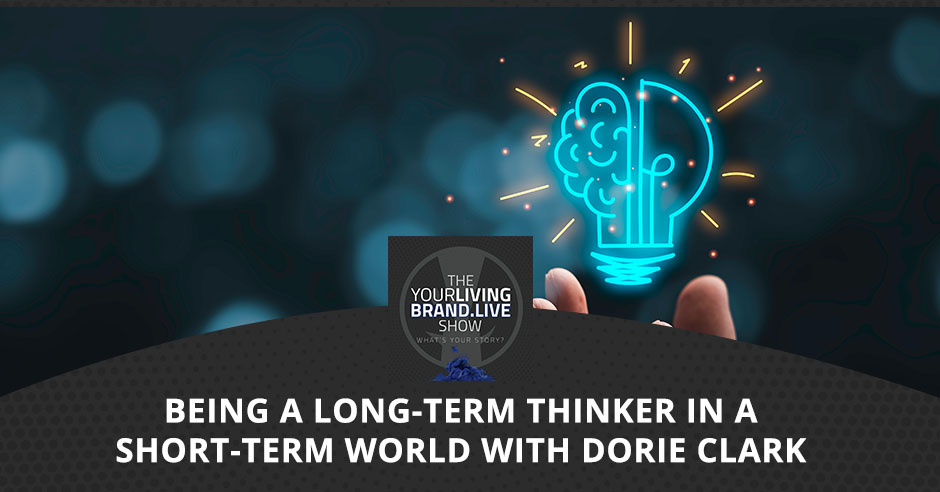
Achieving goals requires one to be willing to work hard in the present to see the results in the future. However, being a long-term thinker in a short-term world no easy thing. The pandemic made us realize that we can make long-term plans but might have to take unexpected detours. Today, Ben Barker sits down with Dorie Clark as they talk about long-term thinking in a fast-paced, short-term world. Dorie is a communication coach and bestselling author who helps people and companies figure out how they can successfully get their message heard in a noisy and crowded environment.
—
Listen to the podcast here
Being A Long-Term Thinker In A Short-Term World With Dorie Clark
[00:01:17] In this episode, I have the one, the only, the incredible, Dorie Clark, joining me on the show. If you don’t know her, her book is The Long Game. We’re going to talk about it, but what we’re going to talk about is how to be a long-term thinker in a short-term world. Dorie, welcome to the show.
[00:01:34] Ben, I’m so glad to be here. Thanks.
[00:01:38] I am excited to have you. Shout out to my buddy, Kurt Anderson, who I know is one of your students. He’s a buddy of mine. He’s my one-team PR department. He says, “You got to interview Dorie.” I started doing some research on you. I had seen you online and things that you’ve done on LinkedIn, but I didn’t get to know you until I started doing a little bit of research on LinkedIn.
I love your passion and the things that you’re doing and how you help people and how focused you are. It’s probably allowed you to be the incredible person you are. I’m going to let you tell your own story because I’ll never do it justice. Why don’t you let people have a little understanding of who Dorie Clark is? What brought you to this point? We’re going to talk about long-term thinking, because it’s something that God knows we need more of in this world.
[00:02:28] My Cliff Notes version of my story is I grew up in North Carolina. I was always a humanities kind of person. I studied Philosophy as an undergrad and I have a graduate degree in Theology. I ended up in my twenties having this succession of careers, in which nothing was working out exactly the way that I thought. I became a newspaper reporter and got laid off. I couldn’t find another newspaper job so I started working in politics, doing political communications. I worked on a governor’s race in Massachusetts. I worked on a presidential race in the US. There were some pretty cool high-profile races, but everybody lost. I had to come up with something else.
[00:03:14] It wasn’t your fault.
[00:03:19] Hopefully not my fault. I ran a bicycling advocacy nonprofit for a couple of years. Eventually, I decided that I would go out on my own. At age 27, I started my own business, doing marketing communications strategy consulting. I have been doing that ever since. In the interim, I’ve written four books. I’ve begun teaching over the past several years at Duke and Columbia. I worked with a lot of different clients and give a lot of talks. My main goal is to help people and companies figure out in a noisy and crowded environment on how they can successfully get their message heard.
[00:04:02] My reason for being is how do you stand out in a world that’s full of crowded noise? My question to you to start off with is how do you go from getting a Master’s or a PhD in Theology to getting into the newspaper business? Where did that come from?
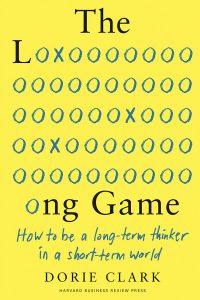
[00:04:18] There was one more closed door that I neglected to mention, I thought after getting my Master’s degree that I wanted to become an academic because I loved school and universities. I applied to get a Doctorate. I wanted to study English literature with a focus on religion. I ended up getting turned down by all of these schools that I applied to. I needed to make a quick pivot because I did not have a plan B at that point. I decided I would do some internships. It laid the groundwork pretty effectively.
For one internship, I was working for a state representative in Boston. For one internship, I was working as an intern at a magazine. I got these little tiny clips. It’s like 100 words in the magazine, but it was exciting. I was able to leverage that into starting to freelance for this publication. It was an alternative newsweekly called the Boston Phoenix, which was respected in its day. It’s now defunct. Anyway, I ended up getting hired for a job as a political reporter there.
[00:05:31] Most people don’t appreciate the value of an internship. I look at those internships as hopefully paid lessons to learn to sit there and say, “Do I like doing this? Do I have a passion for this? Am I any good at this?” I wish when I had gone to university, there had been internships or co-ops or somebody has given me the opportunity to sit there, go, “This is what you should do.” My degree is in Political Science and International Relations with a bent on Middle Eastern terrorism. I spent the first ten years of my career doing high-tech and the last 25 years in communications. I had no idea what I wanted to do when I graduated from the university as most people don’t.
The ability to go into places and say, “Let me try this.” Without feeling like you’re going to fail, you have this idea, “I’m going to be here for 4 months, 8 months, or a year.” Try it out either you like it or you don’t like it. If you do, all in. If not, at least you gave it a good college try, let’s go for it. That’s awesome that you were able to make those types of pivots and figure that out.
What were the things that you learned during that time before you became an entrepreneur that puts you in the best stance to become an entrepreneur? What are the lessons that stand out in your mind that sit there and go, “I’m still using this. I’m still thinking about this now. These are the things that I want to instill in other people to be able to help them be successful?”
[00:07:05] One, I know working for the state rep, this was a guy who was media savvy. One super simple rule, but a lot of people don’t recognize it, is when the press calls, assuming you want to be quoted by the press, call them back fast. It’s stunning to me the extent to which people who should know better don’t do that and they dawdle. Reporters are under huge pressure.
They have these intense deadlines. If you can be the person that calls them back first, you’re making their life easier. Nobody likes to be under the stress of having to write your piece right at deadline. You are likely to get quoted and get a lot more play in the eventual article if you call early because you can essentially shape the narrative as they’re writing it.
Something that’s simple was valuable to see in action as a principal. Another element that was valuable, in some ways, the best training that I had early on for being an entrepreneur was being a freelance writer because it’s literally a case of you eat what you kill. The currency there is, do you have interesting story ideas, yes or no? Is it something they are interested in? Is it something that they haven’t heard before? You need to train yourself to look for those things.
The pandemic made us recognize that we might make a long-term plan, but we might have detours. Share on XLook for what’s new, what’s interesting, and what’s anomalous. The ability to do that, to train yourself in these high stakes situations, because if you’re a full-time freelancer, it is high stakes. That’s how you live. Slightly less than a year that I spent doing that was extremely valuable for me because a lot of the work that I do now, you could say the marketing or platform building that I do as a consultant has been through writing articles for high-profile publications. That skill has been helpful.
[00:09:03] To get into those two things is that I love the fact that call people back. It’s such a simple thing, but in this world where ghosting tends to be the norm, it’s amazing when you call somebody at back, whether it be somebody who works within your company, a vendor, a customer, or whatever. When we can call somebody back, we’re getting attention from them that nobody else is getting because we’re giving them that simple courtesy of being there for them.
That’s an incredible thing that most people don’t realize the power of getting back to people. Even if it’s, “I don’t know. Let me find out for you,” it’s giving people the ability to say, “I heard you. I understand you. Here’s either the information you need. Can you wait fifteen minutes, an hour, or a day until I can get back to you with some real information?”
This is the meat of the thing that I want to talk about. It’s the long-term thinking. This plays off of everything that you’ve said up to this point, which is we need to think long-term. You look at companies that are ruled by stock reports. What are the quarterly earnings? What are the yearly earnings? What did we do this day? What did we do this week?
What did we do this month? That’s what people are focused on. We’re not thinking about the next year, 5 years, 10 years, the next generation, or the next millennia of how we build something for the long-term. I want to get your thoughts on that. When you were writing the book The Long Game, what were you thinking about when you start to put the premise in mind?
[00:10:43] In many ways, the context changed around me, even though the core message stayed the same. It was interesting to witness that happen in real-time because as I was developing the concepts behind The Long Game, it was 2018 and 2019. A lot of what I was thinking about and looking at was the Hurlyburly around us. Everybody was going fast and hard. Many people essentially feel bad because they looked around things are happening so much faster for them. “What do they know that I don’t know? What am I doing wrong? Why isn’t it working? Maybe I need to be traveling more or I need to be doing more on social media.” This endless stream of frenzy and comparison.
Nobody likes feeling that way, but we all get caught in the trap of it. I thought, “If we can refocus ourselves on the long game or the fact that we’re not competing against other people, we have to run our own race here.” That would be an important message. That was the original context of the book, which still holds, but there are some things that happened between here and there. Notably, the book got accepted by my editor on February 28th, 2020.
Literally the next morning, the first case of COVID was diagnosed in New York, which is where I was living at that time. Within a week, everybody’s completely freaked out. All of a sudden, we went from so much movement, frenzy, and travel to everybody being completely freaked out. Also, we had to be short-term thinkers. Any long-term plans we had developed all blew up in our faces. There’s no call for long-term thinking in the thick of COVID because it’s not going to fly. One of the things that I’ve come to believe is that short-term thinking has its place. It’s valuable when you’re in a crisis. You have to be able to move fast and pivot and adapt.
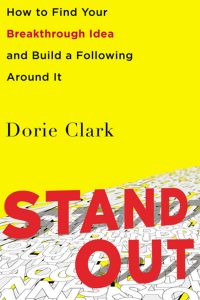
Also, it can’t be the only thing you do. We get into dangerous situations if it’s the only thing we do because it means we’re reactive and not proactive. We’re not shaping anything. We’re not shaping our destiny and the direction that we want to go. Most of us do have some ambition about where we’d like to go. For me, The Long Game, in many ways came out in September of 2021. It’s a little bit of reclamation or a stake in the ground of, “We’ve had plenty of short-term thinking. That’s great. We will celebrate that. Now it’s time to balance the portfolio.”
[00:13:30] The first question is, were there any rewrites between February 28th, 2020 and when the book was released? Did you have to sit there and go, “Because of what’s happened over the last twelve months, this no longer applies. I need to delete this chapter, scrap it and replace it?” Did you reread everything and say, “As we’re moving forward, the situation and dynamics have changed. We’ve had the black swan moment, but the material is still good and stands on its own?” What happened to you at that particular point?
[00:14:02] The only major change was the first draft of the book that I wrote, which I sent out to some friends and peer readers and things like that. It started with the pandemic because it’s looming so large. As people read it, they raised a good point, which is, “This seems of the moment now, but five years from now, it’ll be pandemic. Maybe you need to start somewhere else.” I thought, “That’s right. I don’t want it to feel dated like, ‘This is a pandemic book.’” I moved some of those observations elsewhere rather than opening the book with them.
That was the major change. Ultimately, the pandemic made us temporarily recognize clearly, “I might make a long-term plan, but we might have detours. We might not get there, but I don’t think in general that it shook people’s faith in the belief that having long-term plans was a good thing.” We wished to be able to have them. We aspired to have them, “Won’t it be good to get back to a time when we can think long-term?” Fortunately, we’re slowly beginning to get back to that place where it’s more feasible. Most of us welcome that.
[00:15:50] It’s aspirational to be thinking about, “What’s next? Where do we go from here?” You talk a lot about strategy. How do we make sure that we build the strategy to be able to make sure that we can be there for the long-term? People are now ready and hopefully start thinking again about, “How do I plan for the future? How do I keep one eye on today? I understand COVID is still here. People are still getting sick. There are still challenges, but I still need to plan for my future. I still need to look 6 months, 1 year, or 2 years down the road and plan. What the understanding is no plan is perfect. Things may change. I may need to be more resilient. I may be a little bit more adaptable, but I need to start thinking long-term again.” How do we help people move from the crisis short-term think about now and tomorrow and that’s it mentality that they’ve been in for the last few years to get them thinking aspirationally and long-term again?
[00:16:55] A big part of it is literally reminding people that there’s another alternative because as humans, we tend to get into rots. We tend to like, “I’m doing a thing.” Unless you’re forcibly moved off of it, you keep doing that thing. For a lot of us, short-term thinking, responding to stimuli and reacting became the default. Many of us is like, “There is a different way of doing things. I do know how to do that. I just need to wake it up again.” It’s muscles that have become flabby over the past few years that we need to perkup. I’m curious, Ben, how do you think about long-term thinking or long-term strategy in your life?
[00:17:53] For me, I’ve always been an aspirational person. I’ve always been a person that says, “Today is good, but tomorrow is happening. There will always be tomorrow. One day, I will not wake up. My tomorrow went out, whether I’m here or I’m not here, the world will still go on.” My goal is not just to plan for my future, but to make the world a little bit better place for the people that continue when I’m no longer here. I believe that we need to always be thinking about the next generation. I love the thinking of a family business where all of a sudden you sit there going, “We have generational money.”
These people think about investing for decades. We’re thinking about, “What are we going to do with this money over the next 10, 20, to 30 years? How do we make sure that the grandchildren are taken care of and can live in the same wealth, opulence, and lifestyle that we are and they’re instilled with the mentality that their job is to make sure that their grandchildren can live in the same opulence and lifestyle that they are?” That’s a wonderful place to be whether you have $100 in your pocket or $100 million in your pocket to be able to sit there and say, “My goal is to live my life the best that I can,” and always be sitting there going, “What’s next? Where’s the fork in the road? Do I go left or right? I don’t know. Let’s go around a corner and see where it goes.” It’s instilling that belief in others.
Today is good, but tomorrow's happening. Share on XMy goal and my aspiration in life are to enable other people to ask the questions, “Why? Why not? What if?” If we can get to that point and start thinking beyond the crisis of the day or the panic of the hour and start saying, “Will this matter in 1 year, 5 years, or 10 years from now? Probably not. How much time and energy are you going to focus on this rather than looking at where you could be instead of where you are now?” That’s where my thought processes go.
[00:20:04] One of the opening anecdotes I have in The Long Game is talking with a colleague of mine, a good friend named Martin Lindstrom, who’s a branding advisor. He was telling a story about a royal family that he works with. He was saying that in the initial meeting, the monarch said to him, “Mr. Lindstrom, I don’t want you to be thinking short-term about this. This is a long-term endeavor.” Martin said, “Tell me what you mean by that.” The Monarch said, “We’ll know if you succeeded if this generation does well.” That’s very much to your point.
[00:20:42] I have a good friend of mine who’s in the envelope manufacturing business. His family does fairly well. They’re well-diversified. He went to this worldwide conference and he met a Japanese family who’s in the business. These people control the envelope manufacturing business across Southeast Asia. It is hundreds of millions, billions of dollars in business. He was talking to what obviously was the heir apparent to the company. He assumed it was the son. He says, “No, I’m the son-in-law.” He says, “You have the same name as the family.” He says, “Yeah. The deal was if I was to come on board, be part of the family, and be accepted within the family, I needed to change my name so the family name continued and that my heirs and my heirs’ heirs maintain that same family name.”
That’s commitment. That’s the level of legacy that we’re talking about when we’re talking about long-term thinking. It gets beyond the minutiae of the day and gets people to think about, “What’s the legacy we want to leave behind? What are the things that we want people to think about when we’re not around anymore or we’re no longer in the room? How do we want people to think about us when we’re not here? What do people want to think about what we’ve achieved when we’re not allowed around to tell the story ourselves?”
We need as individuals, companies, organizations, nonprofits, or whatever to start thinking about, where do we want to be seen 1, 2, 3 decades, and longer down the road, instead of worrying about how much money were we able to steal out of our client’s pockets this quarter? That’s the mental shift that I would love to see. The aspirational part that I’m at is to sit there and go, “How do we make sure our customers are with us 20, 40, 50, or 75, and three generations later, our grandchildren are doing business with their grandchildren?”
Let’s talk about that from a strategic level. How would you go about enabling that shift? That shift in mentality is difficult for people. It’s extremely difficult to get people out of their heads and the here and now, and start looking beyond the hill and over the horizon. When you’re talking to your corporate leaders and companies that have always done it this way, how do you start making those changes? Those changes don’t come immediately. They don’t come easily and without a fight. How do you get the old companies to sit there and go, “There could be a better way?”
[00:23:34] This is the question. I would say that the first step is to become aware of and look carefully at the structural incentives. There’s a famous saying by Upton Sinclair, “It is hard to get a man to believe something when his paycheck depends on him not believing it.”
[00:23:52] That’s a conversation I had with a client.
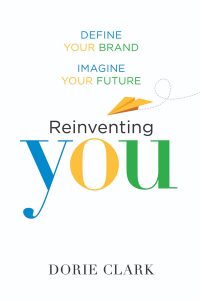
[00:23:57] It is apt here because if in your company all of the structural incentives are pointed towards short-term results, that is what you’re going to get. That’s what you’re telling people you want. To the extent that you have authority over that, if you are a leader and can look at that, can become aware of the consequences of it and hopefully change them, when you change the incentives, you change the results. If you are not in a position to make the change yourself, you certainly can attempt to advocate for it. It doesn’t mean you will be successful, but starting conversations about how we could reframe and pull back to a more long-term focus or at least balance it a little bit can be quite valuable.
What is often perhaps even more alarming or disturbing is it’s true that sometimes we are trapped in a system where we are incentivized to be short-term, but sometimes there’s not a system. We’re not trapped in any system, but we are doing it to ourselves. That is the tricky part, to be looking in the mirror and realizing that. This is us constantly checking social media, “How many likes did that post get?” You want to keep score. Watching the kettle boil will change things.
The longer view is understanding, “I need to break out of that need for approval or some of that urgency and stick to the plan.” I’m not saying it’s easy. It requires a huge amount of discipline, but part of where this got hammered home for me in a lot of ways is with my executive coaching clients. I would work with folks, and I still work with folks, where we get together and we’d be meeting every two weeks. We’d have a session that updates me on their progress. The next thing they’d say almost invariably is, “What’s next? What else should I be doing?”
I felt like I’m the meanest person in the world, because every time I’m like, “The thing you should be doing is to keep doing the things you’re doing. Let’s not look for some magic bullet.” In the back of people’s minds, it’s like, “Now you’re going to tell me what the secret is. It’s TikTok, right?” They’re looking for the thing, but often the answer is just time. A little more time is what you need. Doing the work consistently. We need to drill it in our heads and we need to be as disciplined as possible about living it out. It’s hard at first, but over time, turning down the volume on a lot of the external noise does have positive benefits for us.
[00:26:52] It’s funny because I do consulting on developing podcasts for some clients. I tell people, “For the first six months, turn off your analytics. Forget about your analytics. If you can go a year without going crazy and not looking at them, do it.” I’ve got people who do it, but I can’t remember the last time I looked at the analytics on any of my shows. For me, people are going to either listen or they’re not going to listen. They’re either going to respond or they’re not going to respond. Me hitting the refresh button isn’t going to change anything. It’s not going to give me the insights other than a dopamine fix to say, “Fifty thousand people like me. Seventy-five thousand people like me.”
No, they don’t. They found that particular episode interesting. The question is, what are you doing week after week, month after month, year after year? This show is in its sixth year and has 300-plus episodes. I didn’t hit my groove until probably 150 to 200 episodes into this thing. We need to start thinking that way. Marketing, branding, and companies don’t be successful overnight. If you did, you won the lottery and you’ll never repeat it.
The question is whether the successful companies are the ones that are thinking, “We’re going to consistently do this, give this message, and provide this service month after month, year after year, decade after decade. More people will appreciate it because more people will be exposed to it.” Going back to your thing about incentivizing, if we’re not incentivizing quarterly results or monthly results, that’s how people are being paid, they’re never going to focus on the long-term.
[00:28:51] That’s exactly it. In my previous book, Entrepreneurial You, I profiled a guy named Jordan Harbinger, who’s a well-known podcaster. He was this almost inadvertent OG podcaster. He has been doing it since 2013 or something like that. If I remember this correctly, he said that he went for about six years without checking his analytics and literally forgot how to check his analytics.
It's true that sometimes we are trapped in a system where we are incentivized to be short-term, but what’s more alarming is when we’re doing it to ourselves. Share on XIt’s true because, in the early days, it’s going to be 10 people and then 50 people. If you dwell on that too much, you’re going to get depressed. What people don’t understand is it’s so often, whether you’re talking about podcasts, growing your business, or any form of recognition, it’s true with personal finance, at first, it’s very slow. If you’re saving $20 a month, it looks lame.
At the end of the first year, you’re like, “I could buy a pizza.” It’s not that impressive. What people fail to understand is that growth is not always incremental. There’s a certain point where the growth becomes exponential. You need those early inputs in order to get there. When you hit the exponential growth tripwire, it’s extraordinarily powerful. It’s not like you stumble into it. It’s that you do have to have been doing it for 3, 5, or 10 years before it kicks in and the world can see like, “This is a thing.”
[00:30:32] You don’t go to the gym the first time and lift 300 pounds. You start off by lifting twenty and you build into it. By the time you’re lifting 300 pounds, for you, it’s no big deal. For the person next to you watching you lift 300 pounds, it’s extraordinary. A couple of questions and I’m going to let you go because this has been phenomenal, but your time is precious and I value it. The first question is if you could only give one piece of advice to a client right now that would help them move the needle the most, what would it be?
[00:31:08] One of the common problems, which I’m sure you see with your clients too, Ben, is that people feel overwhelmed and barraged with information, inputs, and things they could be doing. The biggest service we can often give is to help people simplify. Don’t think about the twenty things. You could be doing twenty things, but let’s not. Let’s think about one thing. The way that I think about long-term thinking or I define it personally is what is something that I can do now that will make tomorrow better and easier. That’s what it’s about.
It’s having that long-term orientation. This is not long-term per se, but it has long-term impacts. It can be as simple as setting out your gym clothes for the next morning. It’s a small thing you do now, but you’re doing it because you don’t want to be in a wheelchair when you’re 60, 70, or 80. Training ourselves to ask that question, “What is something I can do now that will make tomorrow better or easier,” is a useful discipline for seeing almost anything.
[00:32:20] That got me thinking of one thing I was going to ask you about your strategic assessment. Can that be something that we could share with the audience?
[00:32:30] Yes. For people who are interested in The Long Game or strategic thinking, I do have a free self-assessment. It’s a series of self-reflection questions that helps you think about how to apply the principles in your own life in order to become more strategic and an even more sharp long-term thinker. Folks can get it for free at DorieClark.com/TheLongGame.
[00:32:54] I looked through that. The questions make you think. That’s what I like about it. I don’t want to be able to write the answers immediately. I want the answers to be things that I have to go back and chew on and go, “Why is she asking me this? Now I can go through this, think about it, chew on it, and write it down.”
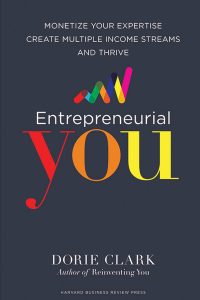
It’s the process of writing the things down that makes it most impactful. I love that you’ve done this. Thank you for providing that to the world. It’s an amazing thing. One last question and I ask this to every single person that comes on my show. When you get out of a meeting and you get in your car and you drive away or you take an Uber, whatever you do, what’s the one thing you want people to think about you when you’re not in the room?
[00:33:40] The thing that I go back to, which is not always the most obvious, but is important to me is probably because I’m an American, is to be friendly. Friendly for some people is not a deep word or a surface thing. What I mean by that is that I don’t think it takes much more effort to be nice to people and be encouraging to people. It makes a big difference to them because not everybody does that.
There aren’t even a lot of people in their lives in general that are friendly, nice, and encouraging. When I think about how I want to be, there are lots of positive attributes that I would like to have associated with you. If we’re talking about the average person getting to know me, it’s maybe different for my intimate as it were, but for the average person, I would like them to say, “She was friendly.” The world needs a little more of that.
[00:34:52] People need to be a little bit more human to each other. We need to care about people a little bit more. Dorie, I love everything that you’ve said and your insights. Keep doing the stuff that you’re doing because obviously people are noticing and engaging with it. Thank you for being such an amazing guest on the show.
[00:35:10] Thank you. It’s good to talk with you, Ben.
Important Links
- Dorie Clark
- The Long Game
- Entrepreneurial You
- Twitter – Dorie Clark
- LinkedIn – Dorie Clark
- Facebook – Dorie Clark
- Instagram – Dorie Clark
- YouTube – Dorie Clark
About Dorie Clark
 Dorie Clark helps individuals and companies get their best ideas heard in a crowded, noisy world. She has been named one of the Top 50 business thinkers in the world by Thinkers50. She was honored as the #1 Communication Coach by the Marshall Goldsmith Leading Global Coaches Awards and one of the Top 5 Communication Professionals in the World by Global Gurus. She is a keynote speaker and teaches for Duke University’s Fuqua School of Business and Columbia Business School.
Dorie Clark helps individuals and companies get their best ideas heard in a crowded, noisy world. She has been named one of the Top 50 business thinkers in the world by Thinkers50. She was honored as the #1 Communication Coach by the Marshall Goldsmith Leading Global Coaches Awards and one of the Top 5 Communication Professionals in the World by Global Gurus. She is a keynote speaker and teaches for Duke University’s Fuqua School of Business and Columbia Business School.
She is the Wall Street Journal bestselling author of The Long Game, Entrepreneurial You, Reinventing You, and Stand Out, which was named the #1 Leadership Book of the Year by Inc. magazine.
A former presidential campaign spokeswoman, Clark has been described by the New York Times as an “expert at self-reinvention and helping others make changes in their lives.” She is a frequent contributor to the Harvard Business Review, and consults and speaks for clients such as Google, Yale University, and the World Bank. Forbes has declared that “her insights connect marketing, social media, communications, learning technologies, and personal discovery to give us a blueprint for success in the future economy.”
She is a graduate of Harvard Divinity School, a producer of a multiple Grammy-winning jazz album, and a Broadway investor. You can download her free Long Game Strategic Thinking Self-Assessment at dorieclark.com/thelonggame.
Love the show? Subscribe, rate, review, and share!
Join the YourLivingBrand.Live Show
Community today:


